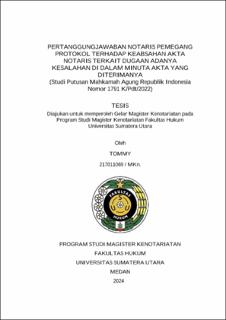| dc.contributor.advisor | Tony | |
| dc.contributor.advisor | Sembiring, Rosnidar | |
| dc.contributor.advisor | Suprayitno | |
| dc.contributor.author | Tommy, Tommy | |
| dc.date.accessioned | 2024-10-07T10:14:36Z | |
| dc.date.available | 2024-10-07T10:14:36Z | |
| dc.date.issued | 2024 | |
| dc.identifier.uri | https://repositori.usu.ac.id/handle/123456789/98168 | |
| dc.description.abstract | The plaintiff in Supreme Court decision No. 1791 K/Pdt/2022 sued the Notary holding the protocol as the defendant. The object of the lawsuit in the Supreme Court's decision was the Notary’s deed within the Notary’s protocol accepted by the Notary holding the protocol. The plaintiff raised issues regarding errors in the Notary's deed. According to expert opinion, the Notary who created the deed is responsible for the Notary's deed within their protocol, but the Notary who created the deed has passed away. The Notary holding the protocol is responsible for storing and maintaining the Notary protocol they received, but this Notary was sued in the mentioned decision. Based on these issues, this research discusses the Notary’s responsibility for the minutes of the deed handed over to the protocol holder, the liability of the Notary holding the protocol in the event of errors in the minutes of the deed, and a legal analysis of the Supreme Court of the Republic of Indonesia decision No. 1791 K/Pdt/2022.
This research uses normative legal research with a descriptive-analytical nature. The data sources used are library data. The technique and tool for data collection used is document study (Library Research). This study analyzes data qualitatively. Normative legal research of a qualitative nature refers to legal norms found in legislation, court decisions, and norms that live and develop in society.
Based on Article 65 of the Notary Position Act, the Notary who created the deed is responsible for the minutes of the deed they made, even though the minutes have been handed over to the protocol-holding Notary. The protocol-holding Notary is not liable for lawsuits regarding the contents of the minutes of the deed in the protocol they received. The Supreme Court decision addressed issues related to Notaries, merely considering the lawsuit lacking parties. The liability of the protocol-holding Notary should be clarified in the Notary Position Act. The public should have a deeper understanding of the scope of the protocol-holding Notary’s responsibility. Judges’ considerations in cases involving Notaries should prioritize the Notary the Notary Position Act. | en_US |
| dc.language.iso | id | en_US |
| dc.publisher | Universitas Sumatera Utara | en_US |
| dc.subject | Legal Liability | en_US |
| dc.subject | Protocol-Holding Notary | en_US |
| dc.subject | Validity of Notary Deeds | en_US |
| dc.subject | Minutes of Deeds | en_US |
| dc.title | Pertanggungjawaban Notaris Pemegang Protokol terhadap Keabsahan Akta Notaris Terkait Dugaan Adanya Kesalahan di Dalam Minuta Akta yang Diterimanya (Studi Putusan Mahkamah Agung Republik Indonesia Nomor 1791 K/Pdt/2022) | en_US |
| dc.title.alternative | Liability of a Notary, The Protocol Holder, for The Validity of Notarial Deed Regarding The Alleged Errors in The Deed Minutes He Receives (A Study on the Ruling of the Supreme Court of the Republic of Indonesia Number 1791 K/Pdt/2022) | en_US |
| dc.type | Thesis | en_US |
| dc.identifier.nim | NIM217011069 | |
| dc.identifier.nidn | NIDN0022096108 | |
| dc.identifier.nidn | NIDN0002026602 | |
| dc.identifier.nidn | NIDN0019016103 | |
| dc.identifier.kodeprodi | KODEPRODI74102#Kenotariatan | |
| dc.description.pages | 134 Pages | en_US |
| dc.description.type | Tesis Magister | en_US |
| dc.subject.sdgs | SDGs 16. Peace, Justice And Strong Institutions | en_US |


